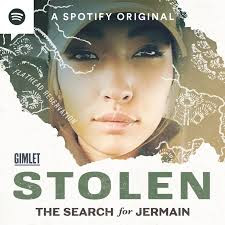The film Wind River was released in 2017, starring Jeremy Renner, who plays a U.S. Fish and Wildlife Service tracker attempting to solve a murder on the Wind River Indian Reservation in Wyoming.
Taylor Sheridan, the film’s writer and director, has said that he wrote the film to raise awareness of the issue of the high number of Indigenous women who are raped and murdered, both on and off reservations.
After Wind River’s flashbulb focused on this issue, nothing much happened to address this human rights crisis.
That was until March 2021, when Gimlet/Spotify premiered “Stolen: The Search for Jermain.” The podcast uncovers the missing and murdered Indigenous women (MMIW) human-rights crisis disproportionately affects Indigenous peoples in Canada and the United States, notably those in the FNIM (First Nations, Inuit, Métis) and Native American communities.
The mental horsepower behind this effort is Connie Walker, the podcast’s host and driving force. Walker, who is Cree from Okanese First Nation in Canada, and has made it her life’s work as a journalist to tell the stories of missing and murdered Indigenous women.
“Stolen: The Search for Jermain,” marks not only her first story with Gimlet Media but also the first U.S. case of a missing Indigenous woman that she’s investigated.
Through eight compelling episodes, Walker painstakingly etches a tragic tale of the 2018 disappearance of a young indigenous mother who went missing after leaving a bar in Missoula, Montana. Through extensive interviews with family members, friends, and law enforcement, Walker enables us to follow the investigation into Jermain Charlo’s disappearance and possible theories about what happened to her.
Walker is on the ground in real time tracking down leads through the dense mountains of the Flathead Reservation, all the while examining what it means to be an Indigenous woman in America, as Jermain was. And as she does so, she reveals the difficulties indigenous women face even today.
According to U.S. crime statistics, Native American women are more than twice as likely to experience violence than any other demographic. One in three Native women is sexually assaulted during her life, and 67 percent of these assaults are perpetrated by non-Natives.
Currently, the federal laws surrounding violent crimes create difficulties in dealing with non-Native perpetrators on native lands.
According to the Supreme Court ruling in Oliphant v. Suquamish Indian Tribe (1978), tribal courts do not hold any jurisdictional powers over non-American Indians and Alaska Natives and therefore cannot prosecute or punish them for their crimes on reservations. Additionally, the Indian Civil Rights Act of 1968 limits the maximum punishment for any crime to a $5,000 fine and up to one year in prison.
Stories of missing and murdered Indigenous women in the U.S. have long gone uncovered by mainstream media, and Walker hoped to change that.
Then about halfway through the podcast’s eight episodes, an announcement was made that brought into sharp focus how the podcast may have triggered action to finally address violence against Indigenous women in the U.S.
On April 22, U.S. Interior Secretary Deb Haaland announced the creation of an investigative unit to probe cases of missing and murdered Native Americans.
The announcement and initiative felt like a major win for “Stolen: The Search for Jermain.”
Haaland said in her confirmation hearings earlier this year that the issue of missing and murdered indigenous women would be a major priority for her at Interior.
“Whether it’s a missing family member or a homicide investigation, these efforts will be all hands-on deck,” Haaland added during her announcement. “We are fully committed to assisting Tribal communities with these investigations, and the MMU will leverage every resource available to be a force-multiplier in preventing these cases from becoming cold case investigations.”
The announcement comes as Indigenous people have expressed hope that Haaland at the helm of the department will mean increased attention on issues specifically affecting the community. Both Haaland and supporters in Congress have emphasized the value placed on environmental stewardship and conservation in Native communities.
“When media like this podcast expose a social and criminal injustice,” begins podcast consultant George Witt, “we find that government officials pay attention and use that added visibility to right the wrong.”
The federal government formed a task force on the issue in 2019 to pursue such cases. Haaland said the new unit will expand on that work and establish a unit chief position to develop policy for the unit. The unit will review unsolved cases and work with tribal, BIA and FBI investigators on active cases as well, according to the department.
“Violence against Indigenous peoples is a crisis that has been underfunded for decades. Far too often, murders and missing persons cases in Indian country go unsolved and unaddressed, leaving families and communities devastated,” Haaland said in a statement. “The new unit will provide the resources and leadership to prioritize these cases and coordinate resources to hold people accountable, keep our communities safe, and provide closure for families.”
During the podcast’s eight episodes, Walker exposes abuse after abuse with Jermain Charlo suffering from domestic violence, neglect and incompetence by the police, and a numbness by society to the travails of indigenous women.
True-crime podcasts attract sizable listener numbers and, in essence, Stolen: The Search For Jermain, is a true-crime podcast dipped in a hard-shell layer of social and racial justice, entrenched misogyny, and neglect by law enforcement.
It’s a terrific listen. After consuming the eight episodes, I guarantee you will cry, then get angry, and then demand action.

Comments
Post a Comment
Thank You for your input and feedback. If you requested a response, we will do so as soon as possible.